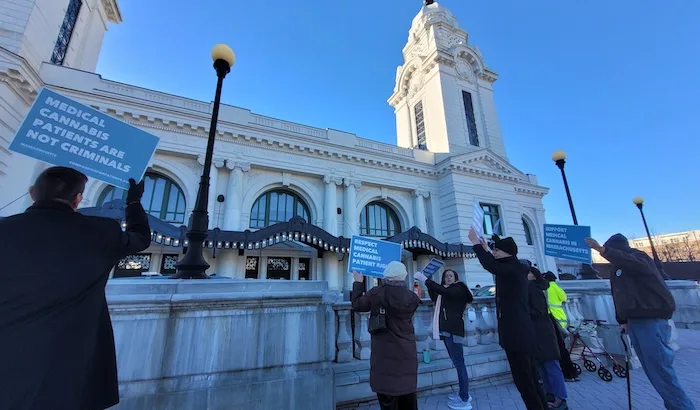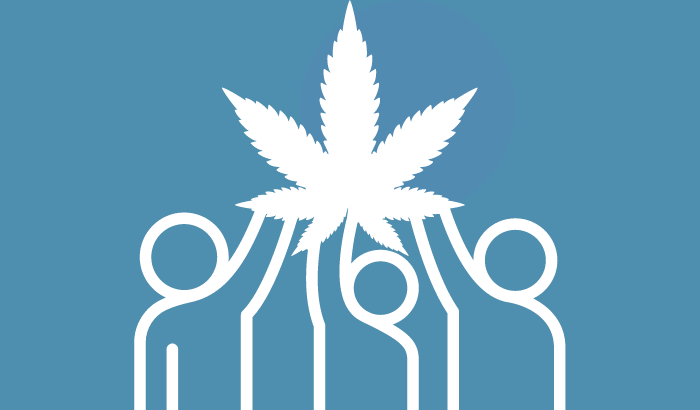
“This decision not only addresses the needs of vulnerable patients but also sets a positive path for updating regulations collaboratively.”
The patients showed up first—six of them—more than 30 minutes prior to the meeting.
The Cannabis Control Commission is located on the second floor of Worcester’s glowing revamped but desolate Union Station public transit hub, and activists, advocates, and prospective licensees with their attorneys often meet up at the bottom of the staircase before regulators commence.
But ahead of today’s meeting, which drew stakeholders from various corners of the Massachusetts weed world to watchdog multiple topics, people calling for the rights of patients to obtain medical access cards remotely arrived before anybody else.
After getting their signs together and hats pulled on tightly, they made their way, some not so easily, across the marble terminal and through the grand entrance, out to a grassy knoll above an odd marble mashup of Christopher Columbus and Benjamin Button.
Looking up at the glass windows where commissioners were readying for another marathon session, they held up their blue Massachusetts Patient Advocacy Alliance signs high and shouted, “DON’T TAKE AWAY OUR TELEHEALTH!” Another two showed up, making for a chorus of eight.
At issue: a waiver granted by the CCC to Certifying Health Care Providers to certify patients online that is set to expire at the end of this year. First put in place to accommodate people who may have difficulty physically visiting such a provider during the COVID-19 pandemic, commissioners extended the permission when they last addressed the topic in February, effectively kicking the can down the road until the final meeting of 2023.
Advocates with Massachusetts Patient Advocacy Alliance (MPAA) were concerned that apathy or potential reluctance by commissioners could end telehealth availability once and for all, so they showed up in person—first outside the building, then in the front row inside of the CCC meeting room.
After introductory remarks by members and a short tussle in which they took nearly an hour to decide who would sit as the acting chair (with CCC Chair Shannon O’Brien still suspended)—plus two breaks and a number of licensing votes—commissioners got to addressing the lingering COVID orders at around four hours into the meeting.
In a quick legal explainer, CCC General Counsel Kristina Gasson noted that in granting a further extension, the commission would be doing it because prohibiting telehealth would make for undue hardships—but not COVID-related hardships. Reflecting that in a technical tweak, Gasson explained, will show the change is “something that is important to the commission and to patients in this space,” and help set precedent for a permanent adjustment in the future.
Guiding the discussion, acting Chair Ava Callender Concepcion deferred to patients, specifically MPAA President & Executive Director Jeremiah MacKinnon, who was sitting feet away from the board in the crowd with other advocates. Concepcion read from a letter MacKinnon sent to commissioners:
I do wish to bring to your attention an urgent concern that has been growing for some time in the medical cannabis community. The waivers that allow initial patient certification visits to be conducted via telehealth are set to expire at the end of the month. The importance of these telehealth waivers cannot be overstated. The idea that this lifeline would disappear is causing significant alarm due to the fact that it is still unclear if the topic will be discussed this month.
Telehealth is essential for many patients and enables them to access the benefits of the medical marijuana program. MPAA recognizes this as an equity issue. Many patients who rely on telehealth are living with mobility challenges, financial limitations, lack of transportation, inability to find child care, and other unique factors. Allowing these waivers to expire would disproportionately affect our most vulnerable residents by increasing the hardship associated with enrolling in the medical marijuana program.
Following a short discussion about steps to “enshrine” telehealth indefinitely in the future, the four commissioners voted unanimously to “allow Providers with an approved waiver to continue to certify new patients via telehealth for initial consultations until the promulgation of relevant regulatory amendments.”
“This extension of the telehealth waivers is a victory for everyone who relies on cannabis for medical purposes,” MacKinnon told Talking Joints Memo after the meeting. “It ensures continuous access to essential care, without unnecessary burdens.”
He continued, “The extension of the telehealth waivers brings peace of mind. Patients in the Medical Marijuana Program can now focus on their health without the stress and uncertainty of whether telehealth will be available. This move isn’t just procedural; it’s a stand for equitable access, recognizing the unique challenges of our most vulnerable patients.
“We deeply appreciate the Commission’s focus on equity by extending the telehealth waivers. This decision not only addresses the needs of vulnerable patients but also sets a positive path for updating regulations collaboratively.”
General Counsel Gasson confirmed that no further action needs to be taken by patients or providers at this time.
























